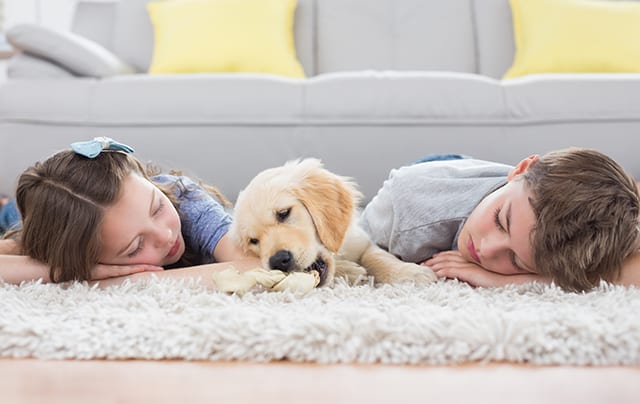Carpet Cleaning in Thurston County
At Power Pup Clean, we respect the drive and vision of pioneers, and in some ways, we also strive to emulate these characteristics by implementing cutting-edge techniques which, by some standards, make us pioneers of a sort too. Unlike other carpet cleaners that use copious amounts of water to clean carpets and fabrics, Power Pup Clean techniques use a very small amount of water to cut back on resources without cutting back on quality and results.
Our encapsulation and extraction method was developed to achieve the deepest clean and freshest results for carpet cleaning, area rug cleaning, upholstery cleaning, hardwood floors cleaning, and tile and grout cleaning, and our state of the art cleaning methods are unsurpassed for pet stain removal – even on the stubbornest of stains. Plus, we give back to our community by donating a portion of our profits to area animal shelters, making us a carpet cleaning choice you can truly feel good about.
If your carpets, floors and furnishings could stand a refreshed course on looking and smelling great, Power Pup Clean can help. Call us today at (206) 931-8758 and let us show you how.
Thurston County Carpet Cleaning Service Area
Thurston County Cities We Serve:
About Thurston County
Did you ever wonder how Thurston County got its name? (Hint: it’s not from Gilligan’s Island millionaire castaway Thurston Howell III, but it does have some relationship to tropical diseases – well, sort of.) To find the answer, you have to look all the way back to 1852, when Thurston County was carved out of the much larger Lewis County which, at that time, comprised the entire Puget Sound region, including the Olympic Peninsula. (The division continued later in the year, when King, Pierce, Jefferson and Island counties were carved out of Thurston County.)
Looking for a name for the new county, settlers decided on Samuel Thurston, the Oregon trail’s first delegate to the U.S. Congress. Yes, Thurston was a politician (and a lawyer), but he was also a pioneer, and that same drive that sent him west from his birthplace in Maine also sent him back to Washington to represent the interests of other pioneers. On one of his trips back to Washington via the Panama Canal, he contracted a tropical illness and died on board the ship (hence, the rather convoluted relationship to tropical disease). Buried in Mexico, his remains returned to Washington two years later, and you can see his grave today at the Salem Pioneer Cemetery.

